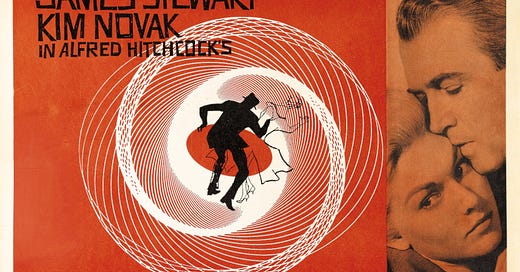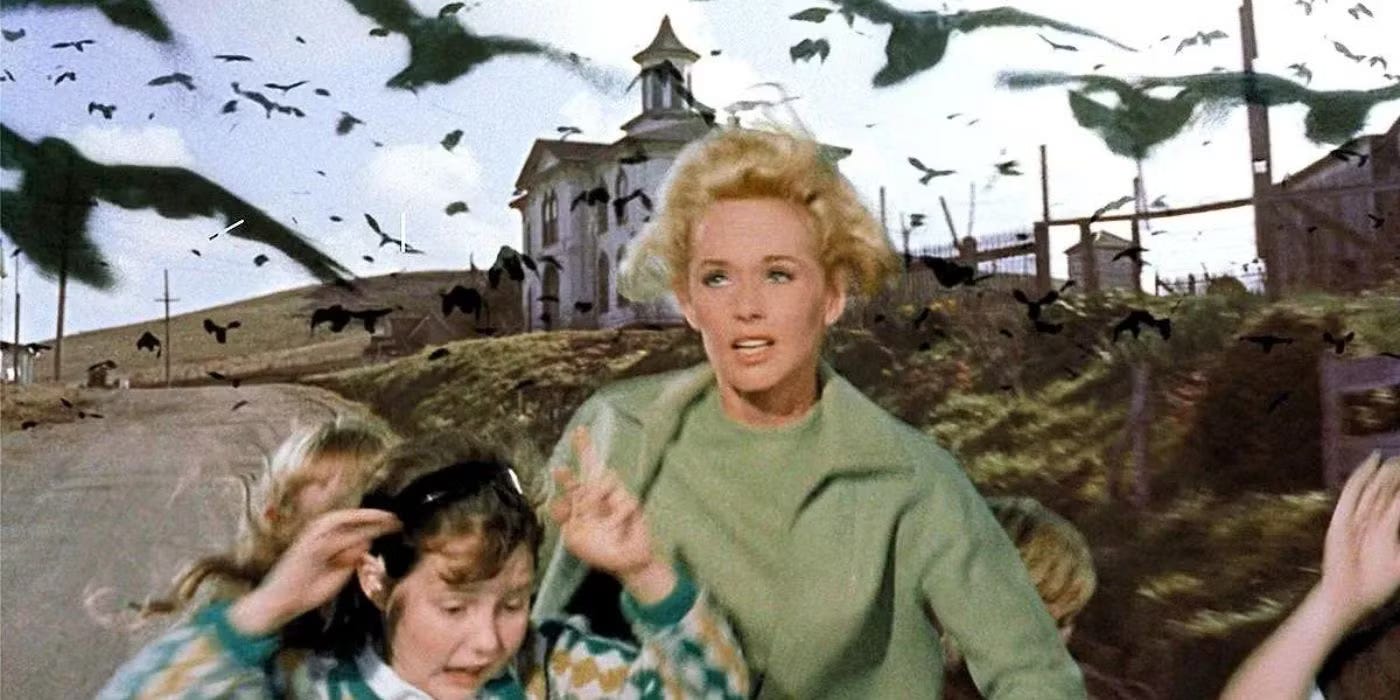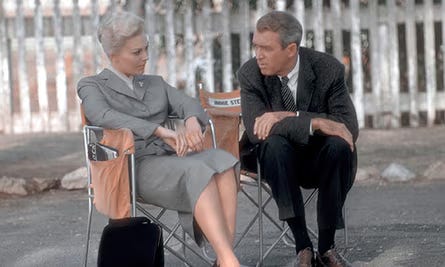AND SCENE… The Mastery of Vertigo
An occasional series where I write about some of my favorite scenes in film.
Alfred Hitchcock’s run of Hollywood films in the 1950s films — beginning with Stage Fright and ending with North By Northwest — is an amazing feat. He was at the absolute peak of his creative powers and had the budget and the clout to do pretty much anything he wanted.
It’s easily his most impressive and productive decade, and one that stands out in film history. Just look at the list:
Stage Fright(1950)
Strangers on a Train(1951)
I Confess(1953)
Dial M for Murder(1954)
Rear Window(1954)
To Catch a Thief(1955)
The Trouble with Harry(1955)
The Man Who Knew Too Much(1956)
The Wrong Man(1956)
Vertigo(1958)
North by Northwest(1959)
There’s no real duds on it. Three (Stage Fright, I Confess and The Trouble with Harry) aren’t amazing, but they aren’t bad either. Four (Strangers on a Train, To Catch a Thief, The Man Who Knew Too Much and The Wrong Man) are great films.
Which leaves us with Rear Window, Vertigo and North by Northwest as unarguable classics. Of these, I think Vertigo is a cinematic masterpiece, and (IMHO) not only his best film ever, but one of the best films ever.
I’ll try not to review the entire film, but to understand why the movie (and the particular scene) is so great entails a little backstory about writing, and the passions that drove the master director.
Hitchcock never took writing credit for any of his films. But he was deeply involved in the writing process, especially during these years. Usually working from source material (a book, play, article, etc.) Hitch would spend hours a day for days on end plotting out the script with the writer. Needless to say, when it came to things like theme, Hitchcock was deeply invested in his scripts.
Which brings us to theme and the deeper motives that drove them in Hitchcock’s films. Just because he dealt with the macabre doesn’t mean that Hitchcock was some kind of, err, psycho. But he did have issues of guilt, abandonment, etc. But his deepest psychosis was surely based on his gigantic girth, and how he could never be considered as a sexual being to his very beautiful leading ladies.
Hitchcock became obsessed with the careers of his leading ladies. It really came to the surface with Grace Kelly, and went over the edge with Tippi Hedren during the filming of The Birds.
But for Vertigo, life really did imitate art to the point of genius, in the story, and in the form of Kim Novak.
In the film, Jimmy Stewart (in his most complex role) attempts to turn a seemingly random girl into the woman of his dreams, the woman he can never have. Starting innocently, this transformation is fraught with drama — real, honest-to-goodness psychological drama that transcends the era.
This transformation cumulates in one of the best scenes I’ve ever seen.
After finally making her subjugate the last of her former self (her hair), Judy comes out of the apartment bathroom to present herself to Scotty Ferguson and the transformation is complete.
What follows is the perfect synthesis of technical skill and fantastic storytelling. Now his dead Madeline, she walks out, into a green light that takes on a ghostly glow that envelops them both.
The camera starts to spin, taking Scotty back. It transforms him into the past — to her — and the score sheds it doubts and brings back the beautiful love theme at its most bittersweet.
It is a scene that does everything. With no words it says everything about both characters and the story. It’s packed with so much emotion — longing, doubt, desperation, love. It’s simply perfect:
From a technical POV, the spinning camera gets the kudos from this scene, and it should. It still looks amazing, and has a “stage” quality that totally fits into the mindset of Scotty.
While I mentioned to ghostly fog, note the brilliant art direction to make it happen. The green neon light is set up from almost the first shot when they walk into the apartment, including in the mirror. As this scene begins, it’s at Scotty’s back, and then almost in his eyes… Before it becomes “his” vision. The art direction and lighting in this scene convey so much.
In fact, the use of green is such a prevalent thematic element I’m surprised an entire book hasn’t been written just about that color in the film. And obviously others given The Birds still above. Just look at these fantastic stills:
Then there’s Bernard Herrmann. He scored some of the best of Hitchcock’s movies from this time. It’s a composer/director relationship probably only second to Williams/Spielberg. Here, it is the apex of his best score. I wish I had a longer clip, but even seconds before, when Judy goes into the bathroom, the score fills the screen with the doubts and mental strain of Scotty’s character, only to be transformed into a swell of a love theme itself filled with dark undertones of dread. Herrmann scored everything from Citizen Kane to Taxi Driver. And he scored other classic movies with Hitch — North By Northwest is the template of action scores. But this film, and this scene… it’s one of the most sublime pieces of music I’ve ever seen put to screen.
Jimmy Stewart was great in this scene, and in the movie. As I said, I think it’s one of his best performances, and I think he’s one of the greatest actors ever. Kim Novak is a little debatable. In all honestly, I don’t think she’s bad. In fact, I think she totally works in this film, for this director.
As for Hitchcock, I’ve pretty much said it. His relationship with Novak after the film, and then Vera Miles, sent him on a spiral. His last film of the 1950s (North By Northwest) is my second favorite. But after that, the obsessions started getting a bit too real.
Spellbound by Beauty: Alfred Hitchcock and His Leading Ladies is a fantastically researched and well-written documentation of this spiral.
Lastly, if for some ungodly reason you’re reading this and haven’t seen Vertigo, please, close this page and go watch it immediately. Even without the Hitchcock subtext, it is simply a classic — a film somewhat panned at the time, but now voted near (or at) the top by critics. And, rightfully so.








